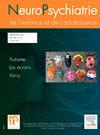注意缺陷多动障碍儿童和青少年治疗教育项目指南:系统文献综述的结果
Q4 Medicine
Neuropsychiatrie de l''Enfance et de l''Adolescence
Pub Date : 2025-09-01
DOI:10.1016/j.neurenf.2025.05.005
引用次数: 0
摘要
法国于2023年11月发布的国家神经发育障碍战略强调了对患有注意力缺陷多动障碍(ADHD)的青少年和成人实施治疗性教育计划的重要性。虽然这些项目是推荐的ADHD多模式方法的知识组成部分,但关于这些项目的内容和结构的具体指导方针仍未明确。本文试图通过系统地回顾文献来识别目标和方法,从而弥合这一差距,这些目标和方法对于纳入针对儿童和青少年多动症的治疗性教育计划至关重要。鉴于治疗性教育在全球文献中的代表性较少,本系统文献综述(SLR)也考虑了关注心理教育和认知行为学习策略的研究,这些研究在临床诊断为8至19岁ADHD的个体中证明了有效性。本综述参考了PubMed、APA PsycINFO和心理学与行为科学等专业数据库。在604篇确定的文章中,只有15篇符合纳入标准,这使得我们能够得出全面的指导方针和见解,为该领域未来的研究和临床实践提供必要的依据。由于一些因素,如依赖于特定的项目评估,缺乏复制,以及缺乏对文化细微差别的探索,目前关于治疗教育的研究仍然明显有限。此外,缺乏针对ADHD性别差异的独特含义的研究,特别是关于激素对女性月经周期症状的影响。这些差距突出表明,迫切需要开展更广泛的研究,以制定更具包容性和适应性的治疗方案,以适应不同人群的个性化需求。此外,确定最有效的干预形式,无论是团体、个人还是混合环境,仍然是一项挑战。该SLR的结果为治疗方案提供了基础主题,其中应强调理解ADHD症状,发展组织能力,加强时间管理,促进自主,练习情绪调节,培养适当的社会沟通技能。这些项目应该主要采用认知行为策略,并优先考虑父母的参与,以加强对习得技能的概括和保留。必须注意的是,虽然这些主题涉及多动症的管理,但它们未能充分涵盖相关的风险和合并症,如焦虑、对立行为、药物滥用或长时间看屏幕。因此,未来的研究应着眼于更全面地了解这些因素,以完善和扩展治疗教育的内容。本文还强调了治疗性教育在治疗ADHD方面的重大贡献,提出了一种多模式的方法来提高整体治疗依从性和结果。尽管如此,仍有大量工作要做,以调整这些方案,以解决个人差异,并探索它们与文化、环境和性别特定因素的相互作用。未来的调查还应该检查包括合并症,以确保治疗性教育项目能够满足多动症患者广泛的需求。通过在正在进行和未来的研究基础上完善这些指导方针,可以实现提高ADHD患者及其家人生活质量的潜力。本文章由计算机程序翻译,如有差异,请以英文原文为准。
Lignes directrices pour les programmes d’éducation thérapeutique destinés aux enfants et adolescents présentant un trouble déficit de l’attention avec ou sans hyperactivité : les résultats d’une revue systématique de la littérature
The National Strategy for Neurodevelopmental Disorders published in France in November 2023 underscores the importance of implementing therapeutic education programs for adolescents and adults with Attention Deficit Hyperactivity Disorder (ADHD). While these programs are integral to the knowledge component of the recommended multimodal approach for ADHD, specific guidelines regarding the content and structure of such programs remain undefined. This paper endeavors to bridge this gap by systematically reviewing literature to discern objectives and methodologies essential for incorporating into therapeutic education programs aimed at children and adolescents with ADHD. Given the sparse representation of therapeutic education in global literature, this systematic literature review (SLR) also considers studies focusing on psychoeducation and cognitive-behavioral learning strategies which demonstrate efficacy in individuals clinically diagnosed with ADHD aged 8 to 19 years. Professional databases such as PubMed, APA PsycINFO, and Psychology and Behavioral Sciences Collection were consulted during this review. Of the 604 identified articles, only 15 met inclusion criteria, allowing for the derivation of comprehensive guidelines and insights necessary for shaping future research and clinical practices in this domain. The current body of research on therapeutic education remains notably limited due to several factors, such as reliance on specific program evaluations, absence of replication, and lack of exploration into cultural nuances. Additionally, there is a shortage of research addressing the unique implications of gender differences in ADHD, particularly regarding hormonal influences on symptoms across the menstrual cycle in females. These gaps highlight the urgent need for a wider array of studies to develop more inclusive and adaptable therapeutic programs tailored to the individual needs of diverse populations. Moreover, determining the most effective format of interventions, whether delivered in group, individual, or hybrid settings, continues to present a challenge. The results of this SLR provide foundational themes to include in therapeutic programs, which should emphasize understanding ADHD symptomatology, developing organizational skills, enhancing time management, promoting self-autonomy, practicing emotional regulation, and fostering appropriate social communication skills. These programs should primarily employ cognitive-behavioral strategies and prioritize parental involvement to reinforce the generalization and retention of acquired skills. It is imperative to note that while these topics address ADHD management, they fail to adequately cover associated risks and comorbidities, such as anxiety, oppositional behaviors, substance abuse, or prolonged screen time. Therefore, future research should focus on a more comprehensive understanding of these factors to refine and extend the therapeutic education content. This paper also highlights the substantial contribution that therapeutic education can make in addressing ADHD, suggesting a multimodal approach to improve overall treatment adherence and outcomes. Nonetheless, significant work remains to tailor these programs to address individual variations and to explore their interactions with cultural, environmental, and gender-specific elements. Future investigations should also examine the inclusion of comorbidities to ensure that therapeutic education programs cater to the broad spectrum of needs displayed by individuals with ADHD. By refining these guidelines based on ongoing and future research, the potential to enhance the quality of life for those diagnosed with ADHD, alongside their families, can be realized.
求助全文
通过发布文献求助,成功后即可免费获取论文全文。
去求助
来源期刊

Neuropsychiatrie de l''Enfance et de l''Adolescence
Medicine-Pediatrics, Perinatology and Child Health
CiteScore
0.60
自引率
0.00%
发文量
61
期刊介绍:
Organ of the Société française de psychiatrie de enfant et de adolescent, Neuropsychiatrie de enfance et de adolescence tackles all fields of child-adolescent psychiatry and offers a link between field and clinical work. As a reference and training tool for students and practitioners, the journal publishes original papers in child psychiatry as well as book reviews and conference reports. Each issue also offers a calendar of the main events dealing with the speciality.
 求助内容:
求助内容: 应助结果提醒方式:
应助结果提醒方式:


